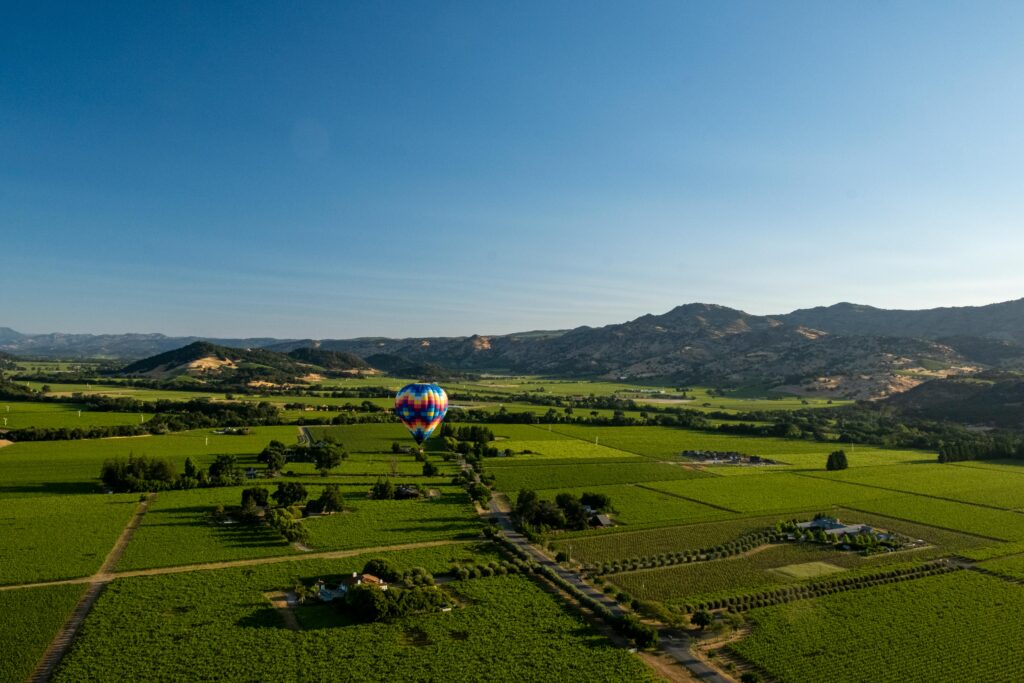By The Wayfarer
Heading to Napa? Make it memorable with the Wayfarer Napa Valley Tour.
If you’re planning a wine country trip and comparing Sonoma Valley vs. Napa, you’re in good company—and asking the right question. These two neighboring valleys offer some of the finest wine experiences in the world, but they wear their identities very differently.
Think of it this way:
- Napa Valley is polished, high-design, and curated for the spotlight.
- Sonoma Valley is slower, softer around the edges, and full of quiet discovery.
Both are beautiful. Both are worth visiting. But depending on your vibe, your pace, and how much you want to spend on a tasting, one might suit you just a little better.
Here’s a side-by-side guide to help you decide between Sonoma Valley vs. Napa—and how to get the most out of your trip no matter where you land.
Napa Valley: The Icon
Napa is compact and carefully built for premium wine tourism. With 400+ wineries, world-famous Cabernet Sauvignon, and estates that double as design showpieces, Napa Valley is all about the experience.
What to Expect:
- Bold, structured wines, especially Cabernet, Merlot, and Chardonnay
- More formal, appointment-only tastings
- Winery architecture that’s often as impressive as the wine
- A reputation for luxury, Michelin stars, and collector’s bottles
Cost:
- Tastings: $40–$150+
- Food + Wine Pairings: $125–$300
- Bottle prices: Often $75–$300+
Best For:
- Celebrations, anniversaries, and “bucket list” trips
- Wine lovers who want bold reds and polished experiences
- Travelers who love a little luxury and don’t mind planning ahead
Sonoma Valley: The Soul
Sonoma Valley, sometimes called the “Valley of the Moon,” stretches from the historic town of Sonoma north toward Kenwood and Glen Ellen. It’s one part of the larger Sonoma County region, and it feels slower, simpler, and more rustic—in the best way.
What to Expect:
- A mix of small, family-run wineries and established estates
- Pinot Noir, Zinfandel, and Rhône varietals are strong here
- Tastings that feel like a casual backyard hang with the winemaker
- More flexibility—walk-ins are still possible at many spots
Cost:
- Tastings: $20–$60
- Food + Wine: $50–$120
- Bottle prices: Often $30–$75
Best For:
- Easygoing wine lovers who want more conversation than curation
- Travelers interested in history, nature, and relaxed hospitality
- Couples, families, and first-timers who don’t want the scene
Compare the Vibes: Sonoma Valley vs. Napa
| Category | Napa Valley | Sonoma Valley |
| Atmosphere | Polished, curated, high-end | Relaxed, unhurried, local |
| Wine Focus | Cabernet Sauvignon, Merlot | Pinot Noir, Zinfandel, Rhône |
| Typical Tasting Cost | $50–$150+ | $20–$60 |
| Crowd Type | Luxury travelers, wine collectors | Weekenders, locals, foodies |
| Appointment Needed? | Almost always | Often, but not always |
| Food Scene | Michelin-starred dining | Farm-to-table cafés & bistros |
| Lodging Vibe | Spa resorts and villas | Inns, cottages, rustic-chic B&Bs |
| Best For | Celebrations, serious collectors | Scenic sippers, casual tasters |
So Which Should You Choose?
Go to Napa if you want:
- Iconic names (Opus One, Domaine Carneros, Stag’s Leap)
- Bold reds and high-end tastings
- A luxury-forward experience from start to finish
Go to Sonoma Valley if you want:
- Fewer crowds and less structure
- Affordable, personal wine experiences
- To pair your wine with history, nature, or a good hike
Pro tip: You don’t have to choose. Sonoma Valley and Napa Valley are just a 30–45 minute drive apart, and many visitors build itineraries that include both.
Add Meaning to Your Napa Trip: Wayfarer Napa Valley Tour
If you decide to explore Napa, take a moment to go beyond the tasting room.
The Wayfarer Napa Valley Tour is a self-guided, GPS-triggered audio experience that helps you understand not just what you’re drinking—but where it comes from.
You’ll hear:
- The layered history of Napa’s winemaking—from Indigenous land to immigrant labor
- How fires, drought, and land use battles continue to shape the valley
- Local voices, forgotten histories, and reflections from the edge of the vine rows
Drive between appointments. Or play it during a slow afternoon as you wind past the vines. It’s the best pairing your wine can get.
Start your Napa Valley Tour here.
Final Thoughts
Sonoma Valley vs. Napa isn’t a rivalry—it’s a choice between rhythms. One is polished, the other grounded. One pours with ceremony, the other with conversation.
Choose what fits your mood, your trip, your taste.
And if you want the best of both? Start with one.
Then come back next season for the other.
Because wine is better when it’s not rushed.
And both of these valleys—like the wines they produce—only get better the more time you give them.



 by xotatech.com
by xotatech.com